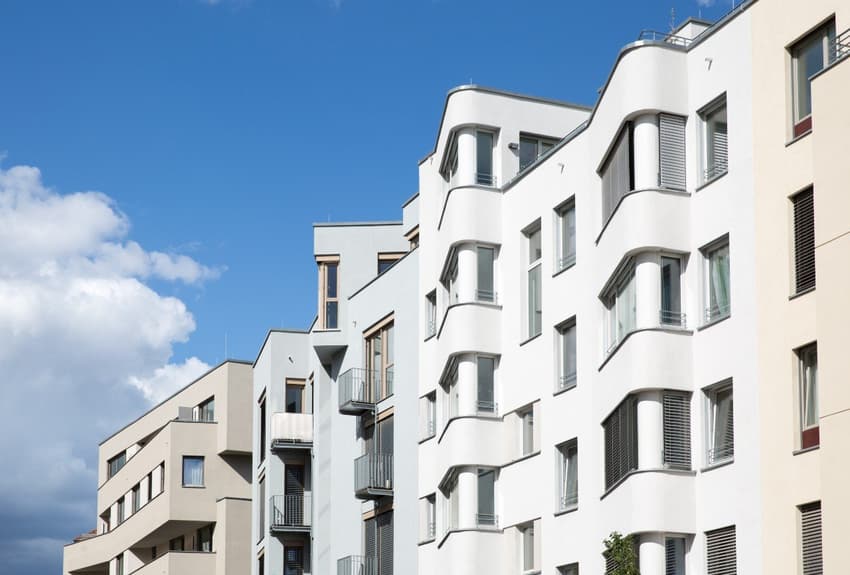Can a flat swap help me find a new apartment in Germany?

Renters in Germany are increasingly turning to flat swaps to find a new home in a tight housing market - but the legal situation can be complicated. Here's what to know if you're considering exchanging your apartment for a new one.
Looking to move? Find your next rental apartment here.
If you're looking for a new place to live in Germany, you may find that on familiar sites like Immobilien Scout and WG Gesucht, a less familiar apartment-finding option has emerged: wohnungstausch.
Wohnungstausch translates to “apartment exchange” or "flat swap" in English, and given the lack of affordable housing options in many cities across Germany, some residents have decided to take this alternative route.
But what does the apartment exchange process entail, what are its advantages and disadvantages, and what does its growing popularity say about the state of Germany’s housing market? Here's everything you need to know about Tauschwohnungen.
READ ALSO: Six confusing things about renting a flat in Germany
What even is a 'flat swap'?
Very basically, it involves swapping your own apartment for someone else's with the approval of both landlords. Each party in the exchange then agrees a new contract with their new landlord. A classic example would be a couple with a growing family swapping with an older couple looking to downsize, or someone with a big place on the outskirts of town looking for a smaller place in the city centre.
While you can come across opportunities for apartment exchanges on websites like WG Gesucht or Immobilien Scout, there are also companies that exclusively facilitate apartment exchanges through their websites, like Wohnungswap.de or Tauschwohnung.com.
On these, you'll usually need to register with details of your current apartment - such as the size, number of bedrooms, the district you live in and any attractive features like gardens or balconies - before you can start getting in touch with people. You can then peruse the flats on offer in your city and see if anyone's looking for a similar place to the one you have.
How many people are doing flat swaps?
According to Tauschwohung’s Managing Director John Weinert, the popularity of apartment exchanges has increased in recent years.
“It’s a mechanism that is becoming more and more popular because the housing market in Germany, especially in the large areas, is very crowded,” he said. “People are waiting in long queues [for] new housing, and rental prices are going to the moon.”
Weinert explains that Tauschwohnungen offers various advantages for apartment-seekers: you can reduce competition with other potential tenants because of the one-to-one connection, you can avoid double payment because you end your original contract to pick up the new one, and in some cases, you can split the moving costs with the person you are exchanging with.

A car with a trailer drives through the forest near Wittenberg. You can sometimes split moving costs when doing a flat exchange. Photo: picture alliance/dpa/dpa-tmn | Christin Klose
But despite their growing popularity (Weinert said his site has drawn significant interest in the last two to three years), Tauschwohnungen make up only a miniscule part of the housing market in Germany. According to Weinert, 5,000 apartments were exchanged through Tauschwohnung in the last two years, compared to the 16 million moves estimated to take place in Germany during a two-year period.
READ ALSO: Why Germany is seeing the 'worst housing shortage in 20 years'
Why aren't more people doing this?
Beyond apartment exchanges being a relatively new and unknown concept, this small number can also be attributed in part to the fact that tenants searching for housing on the free market lack the legal right to exchange apartments, meaning they have to involve landlords in the process to avoid the risk of having their contract cancelled.
“[A swap] is only possible if all parties to the rental agreement consent, so the landlord and tenant of both apartments,” Jutta Harmann, spokesperson for the German Tenants’ Association (GTA) explained. “If I move to another apartment [through] the tenant exchange and have not informed the landlord about it, and if the landlord of both apartments does not agree, [the contract] can be terminated.”
And given that the exchange’s approval is subject to the conditions the landlord sets, Hartmann explained that in many cases, a landlord will try to raise the rent for the new tenant’s contract, thereby nullifying a main draw of completing the swap in the first place.
So while in theory, the Tauschwohnungen process represents a way to make more affordable housing available in cities where it is hard to come by, and some people have been able to take advantage of this alternative, the lack of a legal right to exchange stands to limit its potential.
Could flat swaps become more attractive in future?
Both Weinert and the GTA believe establishing the legal right to exchange under certain conditions through a federal law would address this issue. Such a law could prevent landlords from raising the rent in the case of a swap, eliminating a key deterrent. But Juttman predicts that a change in policy is not forthcoming anytime soon.
“At the moment it is absolutely utopian to think that something like this will happen, since in Germany we currently have a federal government with a Ministry of Justice that does not care about tenancy law. So nothing will happen in the near future,” she said.
For now then, it seems that Tauschwohnungen will continue to play only a small role in the housing market. Still, it is worth keeping an eye out for them, as for the lucky ones, it represents an attractive alternative to the slog of the traditional search process.
“I think it’s still far away [from] becoming a normal way to find a new apartment. But we have to watch closely what is happening here,” Weinert said. “It’s a very, very hard market, and people are looking for alternatives to find a new home.”
READ ALSO: EXPLAINED: The hidden costs of renting in Germany
Comments
See Also
If you're looking for a new place to live in Germany, you may find that on familiar sites like Immobilien Scout and WG Gesucht, a less familiar apartment-finding option has emerged: wohnungstausch.
Wohnungstausch translates to “apartment exchange” or "flat swap" in English, and given the lack of affordable housing options in many cities across Germany, some residents have decided to take this alternative route.
But what does the apartment exchange process entail, what are its advantages and disadvantages, and what does its growing popularity say about the state of Germany’s housing market? Here's everything you need to know about Tauschwohnungen.
READ ALSO: Six confusing things about renting a flat in Germany
What even is a 'flat swap'?
Very basically, it involves swapping your own apartment for someone else's with the approval of both landlords. Each party in the exchange then agrees a new contract with their new landlord. A classic example would be a couple with a growing family swapping with an older couple looking to downsize, or someone with a big place on the outskirts of town looking for a smaller place in the city centre.
While you can come across opportunities for apartment exchanges on websites like WG Gesucht or Immobilien Scout, there are also companies that exclusively facilitate apartment exchanges through their websites, like Wohnungswap.de or Tauschwohnung.com.
On these, you'll usually need to register with details of your current apartment - such as the size, number of bedrooms, the district you live in and any attractive features like gardens or balconies - before you can start getting in touch with people. You can then peruse the flats on offer in your city and see if anyone's looking for a similar place to the one you have.
How many people are doing flat swaps?
According to Tauschwohung’s Managing Director John Weinert, the popularity of apartment exchanges has increased in recent years.
“It’s a mechanism that is becoming more and more popular because the housing market in Germany, especially in the large areas, is very crowded,” he said. “People are waiting in long queues [for] new housing, and rental prices are going to the moon.”
Weinert explains that Tauschwohnungen offers various advantages for apartment-seekers: you can reduce competition with other potential tenants because of the one-to-one connection, you can avoid double payment because you end your original contract to pick up the new one, and in some cases, you can split the moving costs with the person you are exchanging with.

But despite their growing popularity (Weinert said his site has drawn significant interest in the last two to three years), Tauschwohnungen make up only a miniscule part of the housing market in Germany. According to Weinert, 5,000 apartments were exchanged through Tauschwohnung in the last two years, compared to the 16 million moves estimated to take place in Germany during a two-year period.
READ ALSO: Why Germany is seeing the 'worst housing shortage in 20 years'
Why aren't more people doing this?
Beyond apartment exchanges being a relatively new and unknown concept, this small number can also be attributed in part to the fact that tenants searching for housing on the free market lack the legal right to exchange apartments, meaning they have to involve landlords in the process to avoid the risk of having their contract cancelled.
“[A swap] is only possible if all parties to the rental agreement consent, so the landlord and tenant of both apartments,” Jutta Harmann, spokesperson for the German Tenants’ Association (GTA) explained. “If I move to another apartment [through] the tenant exchange and have not informed the landlord about it, and if the landlord of both apartments does not agree, [the contract] can be terminated.”
And given that the exchange’s approval is subject to the conditions the landlord sets, Hartmann explained that in many cases, a landlord will try to raise the rent for the new tenant’s contract, thereby nullifying a main draw of completing the swap in the first place.
So while in theory, the Tauschwohnungen process represents a way to make more affordable housing available in cities where it is hard to come by, and some people have been able to take advantage of this alternative, the lack of a legal right to exchange stands to limit its potential.
Could flat swaps become more attractive in future?
Both Weinert and the GTA believe establishing the legal right to exchange under certain conditions through a federal law would address this issue. Such a law could prevent landlords from raising the rent in the case of a swap, eliminating a key deterrent. But Juttman predicts that a change in policy is not forthcoming anytime soon.
“At the moment it is absolutely utopian to think that something like this will happen, since in Germany we currently have a federal government with a Ministry of Justice that does not care about tenancy law. So nothing will happen in the near future,” she said.
For now then, it seems that Tauschwohnungen will continue to play only a small role in the housing market. Still, it is worth keeping an eye out for them, as for the lucky ones, it represents an attractive alternative to the slog of the traditional search process.
“I think it’s still far away [from] becoming a normal way to find a new apartment. But we have to watch closely what is happening here,” Weinert said. “It’s a very, very hard market, and people are looking for alternatives to find a new home.”
READ ALSO: EXPLAINED: The hidden costs of renting in Germany
Join the conversation in our comments section below. Share your own views and experience and if you have a question or suggestion for our journalists then email us at [email protected].
Please keep comments civil, constructive and on topic – and make sure to read our terms of use before getting involved.
Please log in here to leave a comment.